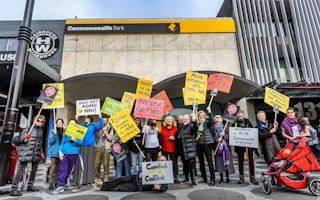Australian financial giant Commonwealth Bank on Monday released its first climate policy statement laying out an ambition to support the transition to a net zero emissions economy by 2050. But environmental groups have slammed it as all but useless, because it fails to limit lending to dirty energy.
The bank, long beleaguered by calls from environmental groups to stop funding new fossil fuel projects and commit to not financing Indian industrial giant Adani’s proposed Carmichael coal mine, released its policy two days after confirming that it would not lend to Adani.
It also announced on the same day that chief executive officer Ian Narev would quit his role at the end of the financial year in 2018.
The key pledges made by the policy include: Reducing carbon emissions per employee from 2.6 tonnes today to two tonnes by 2020, sourcing a quarter of its power needs from renewable energy by 2020, and making up to A$15 billion in funding available to low carbon projects such as energy efficiency and clean energy.
The bank, which is one of Australia’s ‘big four’ financial institutions alongside Westpac, National Australia Bank and the Australia and New Zealand Banking Group (ANZ), also pledged to use the best available science to assess investments, and manage climate risks.
“
A climate policy that doesn’t mention coal or fossil fuels is not a climate policy at all.
Jonathan Moylan, campaigner, Greenpeace Australia Pacific
But as groups including Greenpeace, anti-fossil fuel campaigning group 350.org Australia and responsible finance activists Market Forces pointed out, the absence of any mention of ending fossil fuel funding is a glaring omission.
As Greenpeace campaigner Jonathan Moylan noted: “A climate policy that doesn’t mention coal or fossil fuels is not a climate policy at all.”
The bank “makes a mockery of [its promise to support a transition to net zero emissions] by failing to outline any significant measures to achieve that goal,” continued Moylan, adding that the bank’s lack of action despite recognising climate risks demonstrated “flagrant hypocrisy”.
Blair Palese, 350.org Australia’s chief executive officer, pointed out that Commonwealth Bank’s commitment was far less than the other ‘big four’ banks. Competitor Westpac, for instance, ruled out funding for Adani and all new thermal coal projects in April this year. ANZ also said it would no longer finance “conventional” coal power back in 2015.
Global banks such as HSBC and Deutsche Bank have also made similar commitments.
“The bank’s policy has no commitments to reducing or phasing out lending to or investing in coal or fossil fuels more generally at a time when Australia needs climate leadership from banks and investors,” said Palese. “It puts Commbank well behind Australia’s leading banks.”
In a detailed analysis of Commbank’s policy, Market Forces also pointed out that Commbank has in the past two years loaned A$6 billion to coal, oil, and gas projects; this is more than four times the amount it lent to renewable energy projects.
Commonwealth Bank’s policy is ultimately not compatible with a future where a global temperature rise is capped at 2 degrees Celsius above pre-industrial levels—a limit recommended by scientists and climate experts to avoid the most dangerous effects of climate change—Market Forces’ analysis concluded.
Julien Vincent, executive director, Market Forces, said in a statement that “Commonwealth Bank is not even pretending to make an effort on climate change”. Market Forces will lodge a shareholder resolution against the bank to urge it to do more to manage climate risks, he shared.
Vincent added: “We can’t allow a situation to continue where Australia’s biggest company continues to finance a massive fossil fuel industry expansion while feigning interest in a safe climate future.”
In response to green group criticisms, a Commonwealth Bank spokesperson directed Eco-Business to the organisation’s corporate repsonsibility report, which re-affirms its commitment to a net zero-emissions transition and its desire to play its part to cap global temperature rise at 2 degrees Celsius above pre-industrial levels, but does not make any mention of fossil fuel lending.
The spokesperson also said that the supporting a transition to a net zero emissions economy by 2050 is a major priority for the Group, and will be overseen by the Board.
“We have committed to targeting an average decrease in the emissions intensity of our business lending portfolio over time consistent with our commitment to a net zero emissions economy,” they added.










